2 sept 2019
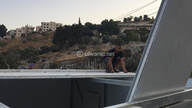
The Israeli occupation authority (IOA) in Jerusalem on Sunday evening forced a Palestinian citizen to demolish his commercial facility in Silwan district, south of the Aqsa Mosque, at the pretext of unlicenced construction.
According to Wadi Hilweh Information Center, Ma’mun Jalal had to knock down his own commercial property with his own hand to avoid paying demolition expenses to the Israeli municipality. video
Jalal was handed an administrative demolition order by employees from the municipality.
Palestinians of occupied east Jerusalem are forced to demolish their own homes upon orders by the Israeli municipality of Jerusalem to avoid paying exorbitant demolition fees.
For Palestinians, obtaining construction permits are prohibitively expensive and goes through bureaucratic and difficult processes. Many Palestinians have no choice but to build their own homes with no permits, even with the threat of demolition hanging over their heads.
Rather than paying the high costs of fighting demolition orders in court, or paying the fines incurred when Israeli crews pull down their homes or structures, Palestinian families are making the difficult choice to do the demolitions themselves. As a result, many have been made homeless, or pushed away from the city center. Others have chosen to remain in the ruins of their properties.
Since east Jerusalem was occupied, Israel has forced thousands of Palestinians from their homes, carried out massive property demolitions and created a serious housing shortage as part of other practices aimed at Judaizing the holy city.
According to Wadi Hilweh Information Center, Ma’mun Jalal had to knock down his own commercial property with his own hand to avoid paying demolition expenses to the Israeli municipality. video
Jalal was handed an administrative demolition order by employees from the municipality.
Palestinians of occupied east Jerusalem are forced to demolish their own homes upon orders by the Israeli municipality of Jerusalem to avoid paying exorbitant demolition fees.
For Palestinians, obtaining construction permits are prohibitively expensive and goes through bureaucratic and difficult processes. Many Palestinians have no choice but to build their own homes with no permits, even with the threat of demolition hanging over their heads.
Rather than paying the high costs of fighting demolition orders in court, or paying the fines incurred when Israeli crews pull down their homes or structures, Palestinian families are making the difficult choice to do the demolitions themselves. As a result, many have been made homeless, or pushed away from the city center. Others have chosen to remain in the ruins of their properties.
Since east Jerusalem was occupied, Israel has forced thousands of Palestinians from their homes, carried out massive property demolitions and created a serious housing shortage as part of other practices aimed at Judaizing the holy city.
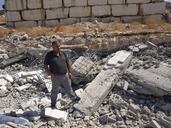
The Israeli military authorities demolished today a mosque and a house in the southern West Bank city of Hebron, according to local sources.
Israeli army units used a bulldozer to destroy al-Ummah mosque in Jabal Jouhar south of Hebron city. video
The demolition included a water well used by the mosque, reported the head of the Hebron Waqf department Jamal Abu Arram, who said that the demolition came as a surprise to them and without a prior warning.
Waqf officials described the demolition of the mosque as an aggression against Muslim holy places and a provocation, as well as a crime against the right of Muslims to worship.
The army demolished as well a house that was still under construction in the same area.
The demolitions took place in Area C, which is under full Israeli military rule and where Palestinians say construction with a permit is impossible to get since Israel does not allow Palestinian development in Area C that makes up over 60 percent of the area of the occupied West Bank.
Israeli army units used a bulldozer to destroy al-Ummah mosque in Jabal Jouhar south of Hebron city. video
The demolition included a water well used by the mosque, reported the head of the Hebron Waqf department Jamal Abu Arram, who said that the demolition came as a surprise to them and without a prior warning.
Waqf officials described the demolition of the mosque as an aggression against Muslim holy places and a provocation, as well as a crime against the right of Muslims to worship.
The army demolished as well a house that was still under construction in the same area.
The demolitions took place in Area C, which is under full Israeli military rule and where Palestinians say construction with a permit is impossible to get since Israel does not allow Palestinian development in Area C that makes up over 60 percent of the area of the occupied West Bank.
25 aug 2019
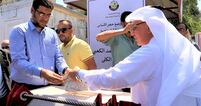
Qatari envoy Mohamed al-Emadi on Saturday reiterated his country’s commitment to supporting the Palestinian people and vital projects in the besieged Gaza Strip.
Emadi, chairman of Qatar's National Committee for the Reconstruction of Gaza, made his remarks after he laid the foundation stone for a kidney dialysis center in northern Gaza.
Emadi said that the center would be built on a 550-square-meter tract of land and consist of three floors, at a total cost of $1.7 million.
The center will also contain about 40 beds and dialysis machines and provide kidney patients with top quality services, according to the Qatari official.
He expressed his country’s hope that such project would improve the services provided for kidney patients and ensure their continuity.
Last Friday, the Qatari envoy announced that his committee would start Sunday to dole out cash aid to 100,000 poor families in Gaza.
Emadi, chairman of Qatar's National Committee for the Reconstruction of Gaza, made his remarks after he laid the foundation stone for a kidney dialysis center in northern Gaza.
Emadi said that the center would be built on a 550-square-meter tract of land and consist of three floors, at a total cost of $1.7 million.
The center will also contain about 40 beds and dialysis machines and provide kidney patients with top quality services, according to the Qatari official.
He expressed his country’s hope that such project would improve the services provided for kidney patients and ensure their continuity.
Last Friday, the Qatari envoy announced that his committee would start Sunday to dole out cash aid to 100,000 poor families in Gaza.
19 aug 2019

Israeli Transport Minister Bezalel Smotrich
Israel's decision to approve 715 housing units in Palestinian towns could be a token gesture, or preparation for a broader takeover of West Bank land
The recent Israeli security cabinet decision to approve construction permits for Palestinian homes in Area C of the occupied West Bank was somewhat of a rarity, “the first such decision since 2016”.
While the figure of 715 housing units in Palestinian towns sounds positive, thus far no details have been revealed – including for example, whether the plans relate to new construction or the retroactive legalisation of homes built without Israeli-issued permits.
In addition to this lack of clarity, these housing units are a drop in the ocean – according to Peace Now, “it is estimated that there are at least a thousand young Palestinian couples in need of housing in Area C each year”.
Discriminatory system
From 2009 to 2016, Israeli occupation authorities approved just 66 construction permits for Palestinians in Area C – a mere two percent of total applications. Over the same time period, there were 12,763 housing unit construction starts in Israeli settlements in Area C.
However, while the new construction permits barely scratch the surface of the needs resulting from an intentionally discriminatory system, it is still an unusual development. Why would a hard-right government – in the run up to elections – take such a step?
One vital piece of context is the White House “peace plan”; Haaretz cited unnamed “political sources” who believe the move “could be due to American pressure”. The approvals came ahead of a visit by a US delegation led by White House adviser Jared Kushner, part of a regional tour promoting the plan.
This possibility was a cause for concern for some in the settler movement; two senior leaders described the Palestinian construction permits as “particularly worrying”, given what they described as the Palestinian Authority’s “clear goal of establishing a terrorist state in the heart of the country”.
They needn’t worry. Reports quickly emerged that the Israeli cabinet decision is in fact “part of a policy shift intended to push out the Palestinian Authority’s involvement in planning and construction in the [occupied] territories”, with Haaretz citing “sources familiar with the details”.
Preventing a Palestinian state
Moreover, Transportation Minister and Union of Right-Wing Parties MK Bezalel Smotrich took to Facebook to publish a detailed explanation for the permits.
Affirming that one of the central goals of his political career is “to prevent the establishment of an Arab terror state in the heart of Israel” (referring to the West Bank), Smotrich wrote: “Now, finally … Israel is forming a strategic plan to stop the creation of a Palestinian state.”
According to Smotrich, the cabinet decision marked “the first time” Israel “will make sure that in Area C, there will only be construction for the Arabs who were original residents of the area since 1994 and not Arabs who came later from Areas A and B”.
Palestinian construction then will be allowed “only in places that do not harm the settlement enterprise and security, and do not create territorial contiguity or a de facto Palestinian state”.
That wasn’t all. “For the first time ever,” the minister went on, “the State of Israel will implement its sovereignty over the entire territory and take responsibility for what happens inside it.”
So, there we have it. The permits for Palestinians in Area C are a demonstration of Israeli “sovereignty” – yet another precursor to formal annexation.
In this light, a connection between the permits and the Trump administration’s plan takes on a more disturbing – though hardly surprising – dimension, suggestive not of a “concession” to lubricate talks, but of Israeli-US coordination with respect to Area C annexation.
Prioritising Jewish communities
Instructively, in parallel to advancing permits for Palestinians, the Israeli cabinet approved some 6,000 housing units in Israeli settlements; the day after, Israeli Prime Minister Benjamin Netanyahu declared on a visit to the Efrat settlement: “No settlement or settler will be uprooted … What you’re doing here is forever.”
But, whether the Palestinian construction permits – should they ever materialise – are merely a token gesture, or preparation for annexation, these developments highlight the limitations of a purely humanitarian-framed critique of Israeli policies of demolition and displacement.
Israel’s crude “separate and unequal” approach to communities and housing in Area C of the West Bank has quite rightly prompted growing international criticism in recent years, with the likes of Amnesty International condemning Israel’s discriminatory planning regime as “unique globally”.
As Israel moves towards a formalisation of Area C annexation, however, there will be those who argue that such a development will benefit Palestinian residents on the basis that Israel will grant them citizenship, legalise their communities, issue permits, and so on.
Of course, such an argument can be countered on its own terms, including by citing the arguments openly made by the likes of Smotrich that planning policy will continue to prioritise Jewish communities (as, indeed, has always been the case inside the 1967 lines).
Settler-colonial project
However, a much stronger position is to understand Israel’s demolition and displacement in Area C, including those permits it does issue, in the context of a much broader apartheid regime where Palestinians are expelled, fragmented and segregated to serve the primary goal of maintaining a “Jewish state” – and the control of land and demography that such a goal necessitates.
Israel’s discriminatory planning regime is a humanitarian and human rights crisis, but it is not only that – and if opposition to demolitions is expressed purely in such terms, critics make themselves vulnerable to Israeli moves such as a token increase in permits, or even annexation.
Ultimately, as elsewhere across Palestine, Israeli policies can be best understood and confronted as part of a decades-long, settler-colonial project – a framing that retains its relevancy whether we soon see formal annexation of Area C, or a continuation of the status quo.
The views expressed in this article belong to the author and do not necessarily reflect the editorial policy of Middle East Eye.
Ben White
Ben White is the author of ‘Israeli Apartheid: A Beginner’s Guide’ and ‘Palestinians in Israel: Segregation, Discrimination and Democracy’. He is a writer for Middle East Monitor, and his articles have been published by Al Jazeera, al-Araby, Huffington Post, The Electronic Intifada, The Guardian, and more.
Israel's decision to approve 715 housing units in Palestinian towns could be a token gesture, or preparation for a broader takeover of West Bank land
The recent Israeli security cabinet decision to approve construction permits for Palestinian homes in Area C of the occupied West Bank was somewhat of a rarity, “the first such decision since 2016”.
While the figure of 715 housing units in Palestinian towns sounds positive, thus far no details have been revealed – including for example, whether the plans relate to new construction or the retroactive legalisation of homes built without Israeli-issued permits.
In addition to this lack of clarity, these housing units are a drop in the ocean – according to Peace Now, “it is estimated that there are at least a thousand young Palestinian couples in need of housing in Area C each year”.
Discriminatory system
From 2009 to 2016, Israeli occupation authorities approved just 66 construction permits for Palestinians in Area C – a mere two percent of total applications. Over the same time period, there were 12,763 housing unit construction starts in Israeli settlements in Area C.
However, while the new construction permits barely scratch the surface of the needs resulting from an intentionally discriminatory system, it is still an unusual development. Why would a hard-right government – in the run up to elections – take such a step?
One vital piece of context is the White House “peace plan”; Haaretz cited unnamed “political sources” who believe the move “could be due to American pressure”. The approvals came ahead of a visit by a US delegation led by White House adviser Jared Kushner, part of a regional tour promoting the plan.
This possibility was a cause for concern for some in the settler movement; two senior leaders described the Palestinian construction permits as “particularly worrying”, given what they described as the Palestinian Authority’s “clear goal of establishing a terrorist state in the heart of the country”.
They needn’t worry. Reports quickly emerged that the Israeli cabinet decision is in fact “part of a policy shift intended to push out the Palestinian Authority’s involvement in planning and construction in the [occupied] territories”, with Haaretz citing “sources familiar with the details”.
Preventing a Palestinian state
Moreover, Transportation Minister and Union of Right-Wing Parties MK Bezalel Smotrich took to Facebook to publish a detailed explanation for the permits.
Affirming that one of the central goals of his political career is “to prevent the establishment of an Arab terror state in the heart of Israel” (referring to the West Bank), Smotrich wrote: “Now, finally … Israel is forming a strategic plan to stop the creation of a Palestinian state.”
According to Smotrich, the cabinet decision marked “the first time” Israel “will make sure that in Area C, there will only be construction for the Arabs who were original residents of the area since 1994 and not Arabs who came later from Areas A and B”.
Palestinian construction then will be allowed “only in places that do not harm the settlement enterprise and security, and do not create territorial contiguity or a de facto Palestinian state”.
That wasn’t all. “For the first time ever,” the minister went on, “the State of Israel will implement its sovereignty over the entire territory and take responsibility for what happens inside it.”
So, there we have it. The permits for Palestinians in Area C are a demonstration of Israeli “sovereignty” – yet another precursor to formal annexation.
In this light, a connection between the permits and the Trump administration’s plan takes on a more disturbing – though hardly surprising – dimension, suggestive not of a “concession” to lubricate talks, but of Israeli-US coordination with respect to Area C annexation.
Prioritising Jewish communities
Instructively, in parallel to advancing permits for Palestinians, the Israeli cabinet approved some 6,000 housing units in Israeli settlements; the day after, Israeli Prime Minister Benjamin Netanyahu declared on a visit to the Efrat settlement: “No settlement or settler will be uprooted … What you’re doing here is forever.”
But, whether the Palestinian construction permits – should they ever materialise – are merely a token gesture, or preparation for annexation, these developments highlight the limitations of a purely humanitarian-framed critique of Israeli policies of demolition and displacement.
Israel’s crude “separate and unequal” approach to communities and housing in Area C of the West Bank has quite rightly prompted growing international criticism in recent years, with the likes of Amnesty International condemning Israel’s discriminatory planning regime as “unique globally”.
As Israel moves towards a formalisation of Area C annexation, however, there will be those who argue that such a development will benefit Palestinian residents on the basis that Israel will grant them citizenship, legalise their communities, issue permits, and so on.
Of course, such an argument can be countered on its own terms, including by citing the arguments openly made by the likes of Smotrich that planning policy will continue to prioritise Jewish communities (as, indeed, has always been the case inside the 1967 lines).
Settler-colonial project
However, a much stronger position is to understand Israel’s demolition and displacement in Area C, including those permits it does issue, in the context of a much broader apartheid regime where Palestinians are expelled, fragmented and segregated to serve the primary goal of maintaining a “Jewish state” – and the control of land and demography that such a goal necessitates.
Israel’s discriminatory planning regime is a humanitarian and human rights crisis, but it is not only that – and if opposition to demolitions is expressed purely in such terms, critics make themselves vulnerable to Israeli moves such as a token increase in permits, or even annexation.
Ultimately, as elsewhere across Palestine, Israeli policies can be best understood and confronted as part of a decades-long, settler-colonial project – a framing that retains its relevancy whether we soon see formal annexation of Area C, or a continuation of the status quo.
The views expressed in this article belong to the author and do not necessarily reflect the editorial policy of Middle East Eye.
Ben White
Ben White is the author of ‘Israeli Apartheid: A Beginner’s Guide’ and ‘Palestinians in Israel: Segregation, Discrimination and Democracy’. He is a writer for Middle East Monitor, and his articles have been published by Al Jazeera, al-Araby, Huffington Post, The Electronic Intifada, The Guardian, and more.
14 aug 2019
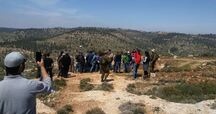
Israeli authorities notified to stop the construction work on three Palestinian-owned houses in the Bethlehem area, the occupied West Bank, citing unpermitted construction as a pretext, said a local activist.
Youth activist Ibrahim Awad-Allah told WAFA staff from the Israeli municipality of West Jerusalem, backed by a military force, stormed an area in the village of al-Walaja to the west of Bethlehem and handed local resident Halima al-A’araj a notice ordering her to stop the construction work on her 70-square-meters house.
Meanwhile, Mayor o the town of Nahalin, Subhi Zaidan, told WAFA Israeli forces handed two local residents notices ordering them to stop the external works on their two inhibited homes to the east of the town of Nahalin, citing the same pretext.
(Updated; Israeli forces handed a fourth notice ordering local resident Khaled Salah to stop the construction work on his 300-square-meters house in the town of al-Khader to the south of Bethlehem)
Israel halts construction of Palestinian home in Bethlehem
The Israeli occupation authorities on Tuesday issued a stop-work order against a Palestinian home under construction in al-Walaja village, northwest of Bethlehem City.
Local sources said that the Israeli authorities handed the Palestinian citizen Halima al-A'raj an order to stop construction in her home in al-Walaja for being "unlicensed".
Al-Walaja village is constantly targeted by the Israeli authorities with unjustified construction restrictions and home demolition campaigns.
Youth activist Ibrahim Awad-Allah told WAFA staff from the Israeli municipality of West Jerusalem, backed by a military force, stormed an area in the village of al-Walaja to the west of Bethlehem and handed local resident Halima al-A’araj a notice ordering her to stop the construction work on her 70-square-meters house.
Meanwhile, Mayor o the town of Nahalin, Subhi Zaidan, told WAFA Israeli forces handed two local residents notices ordering them to stop the external works on their two inhibited homes to the east of the town of Nahalin, citing the same pretext.
(Updated; Israeli forces handed a fourth notice ordering local resident Khaled Salah to stop the construction work on his 300-square-meters house in the town of al-Khader to the south of Bethlehem)
Israel halts construction of Palestinian home in Bethlehem
The Israeli occupation authorities on Tuesday issued a stop-work order against a Palestinian home under construction in al-Walaja village, northwest of Bethlehem City.
Local sources said that the Israeli authorities handed the Palestinian citizen Halima al-A'raj an order to stop construction in her home in al-Walaja for being "unlicensed".
Al-Walaja village is constantly targeted by the Israeli authorities with unjustified construction restrictions and home demolition campaigns.
12 aug 2019
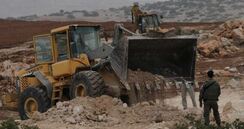
The Israeli occupation army on Monday notified the mayor of Umm Safa village in northwestern Ramallah of its intent to block the agricultural road, which his council and local residents reopened about two months ago with support from the Palestinian ministry of agriculture.
Umm Safa mayor Marwan Sabah stated that the Israeli army handed him a notice about its decision to reclose a 2.5-kilometer road serving local farmers who owns about 2,000 dunums of olive trees.
Mayor Sabah pointed out that the village’s land is entirely located in Area C of the occupied West Bank, where agricultural and development projects are prohibited by the Israeli occupation state.
Umm Safa mayor Marwan Sabah stated that the Israeli army handed him a notice about its decision to reclose a 2.5-kilometer road serving local farmers who owns about 2,000 dunums of olive trees.
Mayor Sabah pointed out that the village’s land is entirely located in Area C of the occupied West Bank, where agricultural and development projects are prohibited by the Israeli occupation state.
